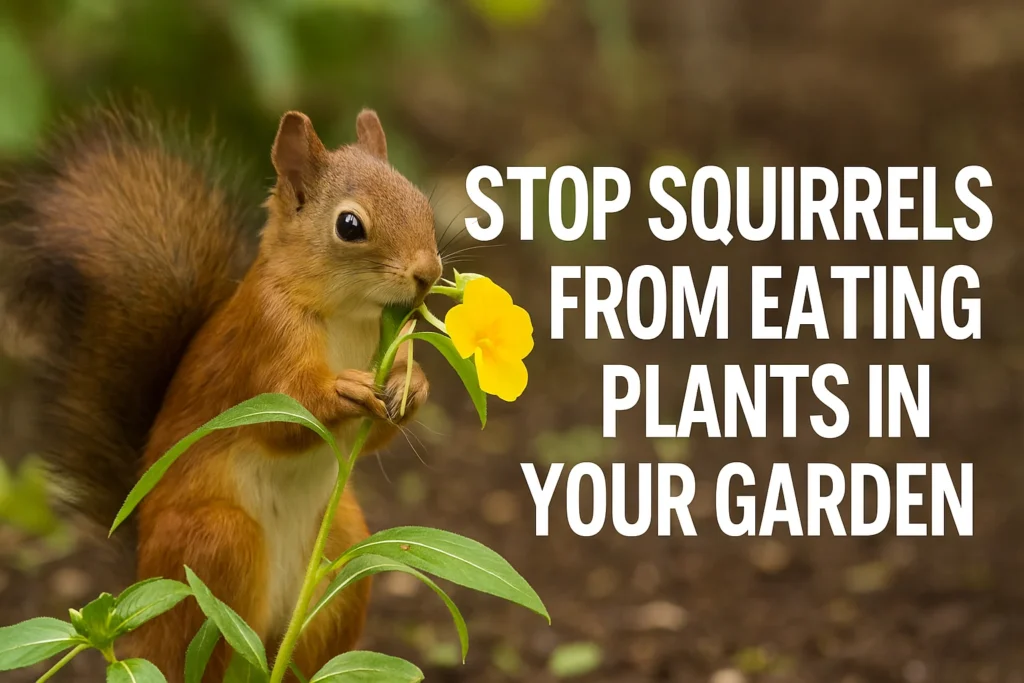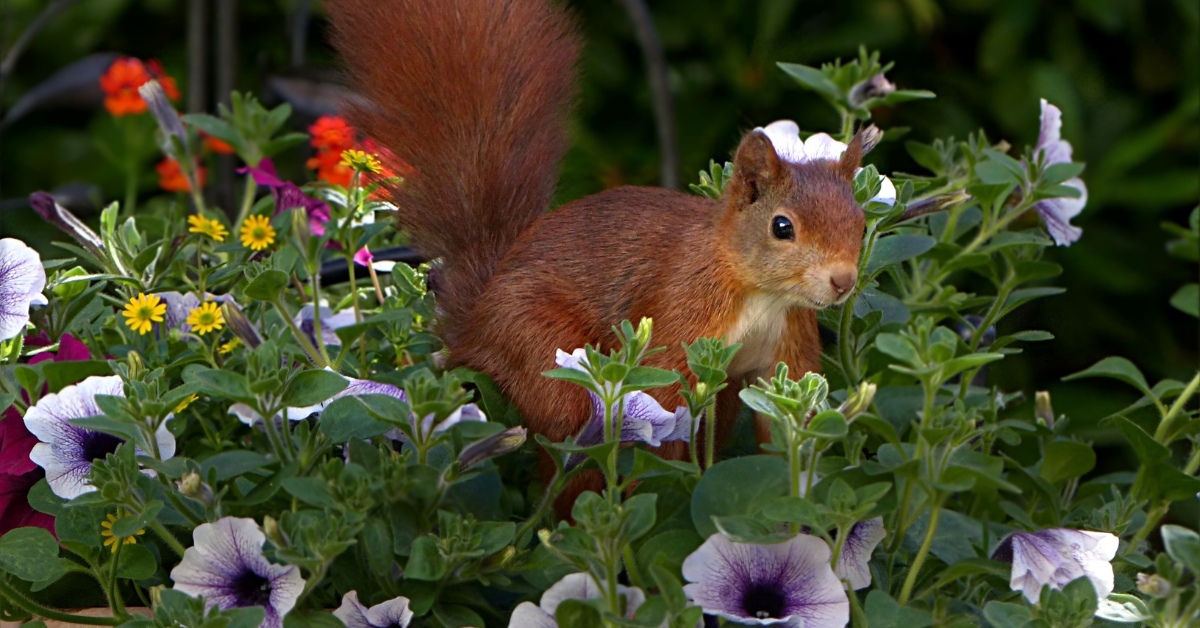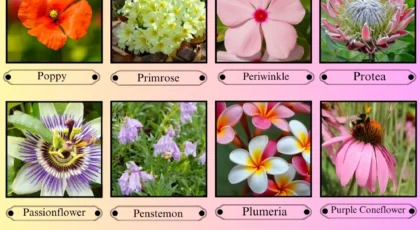Squirrels might look cute as they scamper across your lawn, but when it comes to your garden, they can be destructive little pests. Whether they’re digging up bulbs, nibbling on tomatoes, or raiding your bird feeders, squirrels can quickly turn a thriving garden into a mess. The good news? You can stop them. In this guide, I’ll walk you through how to identify squirrel damage, seven ways to protect your plants, natural repellents, and even which plants they avoid.
Let’s take back your garden from those bushy-tailed invaders.
How to Identify Squirrels in the Garden
Before jumping into solutions, you need to confirm that squirrels are the ones causing the damage. Here are a few telltale signs:
- Digging holes in flower beds or pots, especially where bulbs are planted
- Half-eaten vegetables or fruits, often left on the plant or ground
- Missing birdseed or toppled feeders
- Chewed seed heads or stems
- Squirrel tracks: tiny hand-like prints, often near soil or mulch
You may also spot them during the day—squirrels are diurnal and quite bold, especially in suburban gardens. Once you’ve confirmed their presence, it’s time to take action.
7 Ways to Stop Squirrels from Eating Plants in Your Garden

Squirrels are persistent, but with a few smart strategies, you can make your garden a lot less appealing to them.
1. Use Physical Barriers
Fencing can be your first line of defense. Use hardware cloth or chicken wire around vegetable beds. Bury the edges several inches underground to prevent digging. For raised beds, you can add netting or row covers to physically block squirrels from your crops.
2. Spray Natural Repellents
There are a variety of sprays available at garden centers, but you can also make your own. Mix crushed red pepper, vinegar, and water in a spray bottle and spritz it on plants. Squirrels dislike spicy and sour smells. Be sure to reapply after rain.
3. Install Motion-Activated Sprinklers
These sprinklers shoot a burst of water when movement is detected, startling squirrels without harming them. It’s a great way to keep them off lawns, flower beds, and even near trees.
4. Add Mulch or Gravel Around Plants
Squirrels love digging, but they hate coarse textures. Adding gravel, crushed oyster shells, or thorny mulch around your plants can discourage their tunneling behavior.
5. Remove Food Sources
If you leave fallen fruit, seeds, or nuts around, you’re rolling out a red carpet for squirrels. Clean up any dropped produce, secure your compost bin, and don’t leave pet food outside.
6. Use Garden Decoys
Owl decoys, rubber snakes, and even spinning pinwheels can temporarily deter squirrels. Move them around regularly so squirrels don’t figure out they’re fake.
7. Apply Squirrel-Repelling Granules
Commercial products like Shake-Away use predator scent (such as fox urine) to create a “danger zone” squirrels instinctively avoid. Spread it around your garden perimeter for best results.
6 Plants That Keep Squirrels Away From Your Garden
Believe it or not, some plants naturally repel squirrels. These are great additions to your garden if you’re dealing with constant raids.
1. Daffodils
They contain lycorine, a chemical that’s toxic to squirrels and other rodents. Squirrels tend to avoid them altogether.
2. Alliums (including garlic and onions)
The strong smell of alliums keeps squirrels at bay. Plant them around your vegetable beds like a barrier.
3. Fritillaria
These bulb plants produce a skunky odor that squirrels detest. They’re great companions for tulips, which squirrels love to eat.
4. Mint
Its powerful aroma is too much for many pests, including squirrels. Plant it in pots, though—it spreads aggressively.
5. Hyacinths
The scent may be pleasant to us, but squirrels tend to avoid these colorful blooms.
6. Geraniums
Especially strong-smelling varieties like citronella can help repel squirrels and other garden pests.
Tips for Keeping Squirrels Out of Bird Feeders and Away from Bulbs

🐦 Bird Feeder Tips
- Use squirrel-proof feeders with metal cages or weight-sensitive mechanisms
- Hang feeders at least 5 feet off the ground and 10 feet away from launch points (like trees or fences)
- Add a baffle—a cone or dome-shaped guard—above or below the feeder pole
🌱 Bulb Protection Tips
- Plant bulbs like tulips in bulb cages or under chicken wire
- Sprinkle blood meal or crushed red pepper into the planting hole
- Cover newly planted bulbs with gravel or thorny mulch to deter digging
FAQs:
Squirrels dislike strong smells like peppermint, vinegar, garlic, and cayenne pepper. They also fear sudden motion, loud noises, and the scent of predators like foxes or dogs.
A DIY spray of vinegar, cayenne pepper, and water is an effective, low-cost deterrent. You can also scatter coffee grounds around plants—squirrels dislike the bitter smell and texture.
There’s no single fix, but a combination of motion-activated sprinklers, predator-scent granules, and hot pepper sprays has been shown to be highly effective. Also, keeping food sources cleaned up is essential.
Squirrels are afraid of predators—especially owls, hawks, and foxes. Even the scent of these animals (available in granular repellents) can make squirrels steer clear.
Squirrels are repelled by strong scents like peppermint, ammonia, garlic, vinegar, and hot peppers. Using these smells in your garden—via sprays, essential oils, or natural plantings—can help deter them.
End Note
Keeping squirrels out of your garden takes a little strategy, but it’s completely doable with the right mix of repellents, plants, and proactive maintenance. Don’t get discouraged if one method doesn’t work—layer a few solutions together for best results. Over time, you’ll train them to steer clear of your space.
If you found this article informative, feel free to check out our other articles as well—for more tips on gardening, pest control, and smart outdoor living.


